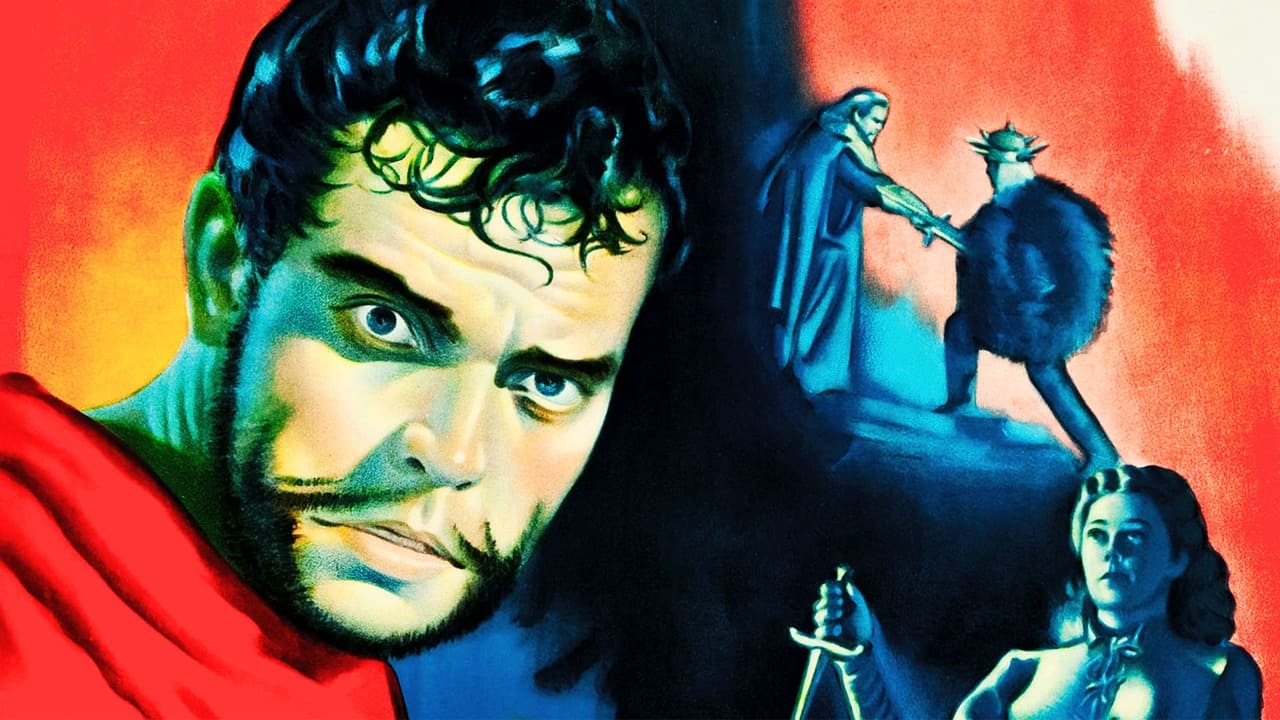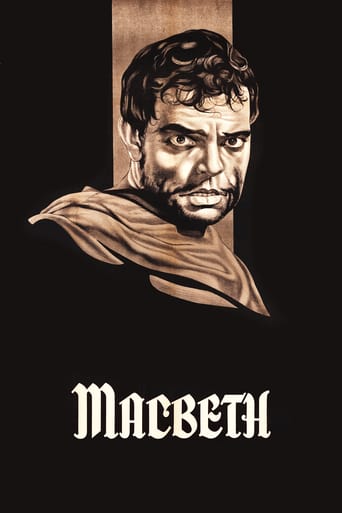

Macbeth (1948) *** (out of 4)Macbeth (Orson Welles) is told by three witches that he will rise to become the King of Scotland. His wife Lady Macbeth (Jeanette Nolan) talks him into killing the King to gain control.It should come as no shocked that Orson Welles' MACBETH hit theaters to a loud crash meaning that it was a a flop at the box office. The film was re-edited and re-dubbed when it debuted in America but thankfully the complete 107-minute print turned up and is now available for viewing. With that said, this certainly isn't my favorite Welles film and it's certainly not one of the best Shakespeare adaptations out there but at the same time the director did very well considering what he had to work with.You can tell that there really wasn't much of a budget but that doesn't prevent Welles for turning in a beautiful looking film. There are some terrific shots to be found here but what I enjoyed the most was the atmosphere that the director created. There's some very dark scenes and some fog that really packs a nice punch throughout the picture. It also helps that you've got a great cast turning in great performances. Of course, the star is Welles and he manages to work some true magic in the role of Macbeth.I wouldn't call the film great because there really wasn't much momentum anywhere in the picture. I'd say that the film is a bit too stagy at times and I'd argue that a tad bit more energy would have helped things. Still, if you're a fan of Welles then this is certainly a must see.
... View MoreLooking back, I realize that Orson Welles received immense fame in movies like "Citizen Kane" and...that's about it. It's a pity the only other thing he did that was remembered was star in commercials about peas. "Citizen Kane" was so good every movie he made afterwards was compared to it. While that is of course his best work, I think it's important we look at all the other wonderful films he made as he truly was in a wide variety of classics. A lot of people probably haven't even heard of this version.This is a great movie because of all the wonderful costumes and set designs. Everything just has great atmosphere here. It's weird how the most recognizable elements from the story are the three witches, who appear relatively little in the play at all. I still regard "Throne Of Blood" as the best adaptation of this play and for that matter, probably any Shakespearean work. The acting is very good in this movie and they know how to create good atmosphere. It was interesting watching this and being reminded of the plot elements of the classic tale. It seems silly to put a synopsis as most people know it already. If not, this movie will refresh your memory as it is a wonderfully faithful adaptation. Orson Welles wanted to be remembered for all of his great movies. ***1/2
... View MoreMacbeth is an interesting film despite its flaws. At times it's very, very interesting, but unfortunately the work is undermined by the use of cod-Scottish accents throughout. All the modernist visual touches and expressionist feel, all the talented delivery of Shakespearean verse (and there is some good acting in parts, especially from Welles) is undone by the insistence that the cast talk as though on the set of Lassie Come Home. One can just about endure non-Scottish actors making a lame attempt at nailing the accent in a film like "Whiskey Galore!" (where there is no alternative) - but it has never been necessary for Macbeth! We know the story is set in Scotland and don't need to be fed constant verbal reminders. Quite the contrary - the (often bad) Scottish accents actually makes the verse harder to hear. Imagine Romeo & Juliet staged with Leonardo Di Caprio using an accent copied from the Dolmio pasta sauce adverts! I suspect that the mistake of using accents was recognised quite soon after production and I have heard that a different re-dubbed version was soon released. One can understand why they did this but the re-dubbed (and cut-down) version must have been worse as the version with brogue is now the preferred one.This massive distraction aside Welles does a good job on a small budget. It does inevitably look stagy, confined and rather monotonous (all shooting being done indoors) but his attempt to create interesting and visually striking cinema from the limited ingredients at his disposal has to be applauded. The nature of the dramatic material doesn't help - Shakespearean text inevitably means lots of lingering shots during soliloquies, and striking design elements that look quite good at first start to look tired when lingered on. The expressionistic, dark, brooding, angular barrenness starts to oppress and bore one after a time. In between the choice speeches there is a lot of rather wooden movement going on as characters shuffle on and off "stage" but this is compensated for by some moments of very good interpretation of the text and compelling drama.Whilst some elements of the film are clumsy (the drunk scene with clichéd tuba music) many exhibit Orson Welles' great vitality and cinematic flare. All his films have these last two qualities to one degree or another and that's why they are ALL very very interesting and worth watching.
... View MoreAfter Laurence Olivier's epic production of Henry V in 1944, movie versions of Shakespeare plays suddenly became viable again after a dwindling of interest in the 30s. And this being the era of film noir, the Shakespeare pictures that appeared in the late 40s and 50s were almost all of the tragedies. Olivier's Hamlet was the big Oscar-winner of 1948, but just preceding it was Orson Welles's take on the overwhelmingly bleak MacBeth.This was the time in which Welles was having his infamous "troubles" with studios that would eventually make him a cause célèbre. Unable to get work with the majors MacBeth finds him working for Republic, a tiny studio yet one that produced some good stuff occasionally. While most Shakespeare adaptations from this period tried to open the plays out a bit, the low budget on offer here actually gives MacBeth a very stagey look. The castle where most of the action takes place is just a sparse couple of walls, a staircase and some scattered props, very much like a stage "building". This actually serves the play fairly well. Low-key lighting and billowing mist hide the gaps in the set and the fact that Welles only had a handful of extras for the "crowd" scenes, but they also give it that stark and stifling atmosphere that MacBeth needs.And that is not to say that this version of MacBeth is not cinematic. Welles's style as a director is, as always, one of style over substance. He is great at visual tricks and aesthetic shots, but didn't really understand the nuances of cinematic expression. But MacBeth is a Shakespeare play which can stand a bit of style over substance. It's not Shakespeare's best story, but it is a very poetic piece, with elements of myth and the supernatural. Welles's quick cuts, roving camera and baroque shot composition actually suit the material, creating some beautifully haunting and rhythmic sequences. The scene of MacDonwald's execution is a fine example, a hypnotic montage of grim faces, MacBeth running to embrace his wife before a gallows, and the drums constantly beating out an eerie tension. Later there is also the dynamic battle sequence, given impact with some rapidly-edited dolly-in shots.Now let's look at Welles the performer. His acting is not exactly world-class, but he really gets into the swing of it. I think more than any other role he played, you can actually forget that it's Welles and just see the character. And he certainly makes a better Scot than he did an Irishman in The Lady from Shanghai. His Lady MacBeth, Jeanette Nolan, was originally a radio actress and unsurprisingly her best asset here is her voice, at times coarse, at others sibilant, every consonant crystal clear, and absolutely full of the character. Despite her lack of experience she seems able to do the visual, physical acting as well. The rest of the cast are uniformly decent – theatrical yes, but never excessively hammy. No-one is trying to steal the scene here.The end result is probably the best film adaptation of MacBeth. It's also an adequate vehicle for Orson Welles's overtly stylised directorial style. The feel of a horror-tinged folk tale is all about this one, and while it doesn't breathe the same life into the bard that Olivier could manage (both as an actor and a director), it is a worthy and enjoyable effort.
... View More